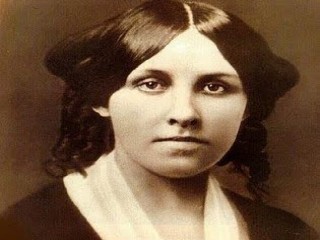
Louisa May Alcott biography
Date of birth : 1832-11-29
Date of death : 1888-03-06
Birthplace : Germantown, Pennsylvania, U.S.
Nationality : American
Category : Famous Figures
Last modified : 2011-05-11
Credited as : Author, and novelist, Little Women
2 votes so far
Louisa was the daughter of Amos Bronson Alcott, and though of New England parentage and residence, was born in Germantown, now part of Philadelphia, Pennsylvania, on the 29th of November 1832. She began work at an early age as an occasional teacher and as a writer -- her first book was Flower Fables (1854), tales originally written for Ellen, daughter of R. W. Emerson. In 1860 she began writing for the Atlantic Monthly, and she was nurse in the Union Hospital at Georgetown, D.C., for six weeks in 1862-1863.
Her home letters, revised and published, in the Commonwealth and collected as Hospital Sketches (1863, re-published with additions in 1869), displayed some power of observation and record; and Moods, a novel (1864), despite its uncertainty of method and of touch, gave considerable promise. She soon turned, however, to the rapid production of stories for girls, and, with the exception of the cheery tale entitled Work (1873), and the anonymous novelette A Modern Mephistopheles (1877), which attracted little notice, she did not return to the more ambitious fields of the novelist.
Her success dated from the appearance of the first series of Little Women: or Meg, Jo, Beth and Amy (1868), in which, with unfailing humour, freshness and lifelikeness, she put into story form many of the sayings and doings of herself and sisters. Little Men (1871) similarly treated the character and ways of her nephews in the Orchard House in Concord, Massachusetts, in which Miss Alcott's industry had now established her parents and other members of the Alcott family; but most of her later volumes, An Old-Fashioned Girl (1870), Aunt Jo's Scrap Bag (6 vols., 1871-1879), Rose in Bloom (1876), &c., followed in the line of Little Women, of which the author's large and loyal public never wearied.
Her natural love of labor, her wide-reaching generosity, her quick perception and her fondness for sharing with her many readers that cheery humour which radiated from her personality and her books, led her to produce stories of a diminishing value, and at last she succumbed to overwork, dying in Boston on the 6th of March 1888, two days after the death of her father in the same city. It is now believed that Alcott actually died from accumulated mercury poisoning.
Miss Alcott's early education had partly been given by the naturalist Thoreau, but had chiefly been in the hands of her father; and in her girlhood and early womanhood she had fully shared the trials and poverty incident to the life of a peripatetic idealist. In a newspaper sketch entitled "Transcendental Wild Oats," afterwards reprinted in the volume Silver Pitchers (1876), she narrated, with a delicate humour, which showed what her literary powers might have been if freed from drudgery, the experiences of her family during an experiment towards communistic "plain living and high thinking" at "Fruitlands," in the town of Harvard, Massachusetts, in 1843.
Author of books:
Hospital Sketches (1863, letters)
Moods (1865, novel)
Morning Glories and Other Stories (1867, short stories)
Little Women (1868-9, novel)
An Old Fashioned Girl (1870, novel)
Little Men: Life at Plumfield with Jo's Boys (1871, novel)
Aunt Jo's Scrap Bag (1872-82, six volumes)
Work: A Story of Experience (1873, novel)
Beginning Again, Being a Continuation of Work (1875, novel)
Eight Cousins; or, The Aunt-Hill (1875, novel)
Rose in Bloom: A Sequel to "Eight Cousins" (1876, novel)
Silver Pitchers and Independence (1876)
Under the Lilacs (1877, novel)
Jack and Jill: A Village Story (1880, novel)
Spinning-Wheel Stories (1884)
Jo's Boys and How They Turned Out: A Sequel to "Little Men" (1886, novel)
Lulu's Library (1886-9, short stories)
A Garland for Girls (1888, short stories)
















